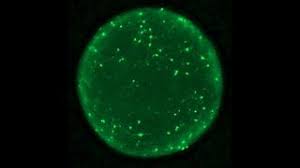Traumatic brain injuries (TBIs) are a major public health concern, affecting millions of people worldwide each year. One of the long-term consequences of TBIs is an increased risk of developing dementia later in life. Researchers have been looking for ways to better understand the underlying mechanisms that link TBIs to dementia, and recent advancements in neuroscience have led to a groundbreaking discovery using lab-grown “minibrains.”
A study published in the journal Nature Communications utilized lab-grown minibrains to investigate how TBIs can increase the risk of developing dementia. Minibrains, also known as cerebral organoids, are tiny 3D structures derived from human stem cells that mimic the structure and function of the human brain. These minibrains offer a unique opportunity for researchers to study complex brain processes in a controlled environment.
The researchers behind the study found that when they exposed the minibrains to a TBI-like injury, they observed the accumulation of a protein called tau. Tau is known to be a key player in the development of neurodegenerative diseases, including Alzheimer’s disease. The researchers also noted an increase in the production of amyloid beta protein, another protein associated with Alzheimer’s disease, in the minibrains following the TBI-like injury.
These findings provide valuable insights into how TBIs can trigger the accumulation of harmful proteins in the brain, ultimately leading to an increased risk of developing dementia. By using minibrains to model TBI-induced brain damage, researchers can now further investigate the underlying molecular mechanisms and potentially identify new targets for treatment and prevention strategies.
Understanding the link between TBIs and dementia is crucial for developing effective therapies to mitigate the long-term consequences of brain injuries. With the help of lab-grown minibrains, researchers can continue to unravel the complexities of brain trauma and pave the way for innovative treatments and interventions to reduce the risk of dementia following a TBI.
In conclusion, the use of lab-grown minibrains in studying the effects of TBIs on the brain represents a significant advancement in neuroscience research. By leveraging this cutting-edge technology, researchers are gaining a deeper understanding of how brain injuries can increase the risk of developing dementia. Ultimately, these findings may lead to new strategies for preventing and treating dementia in individuals who have experienced a TBI.

